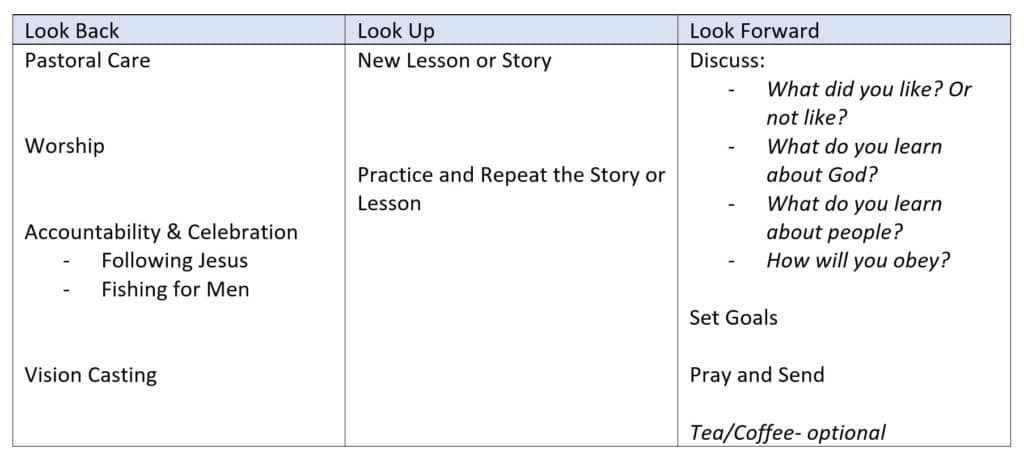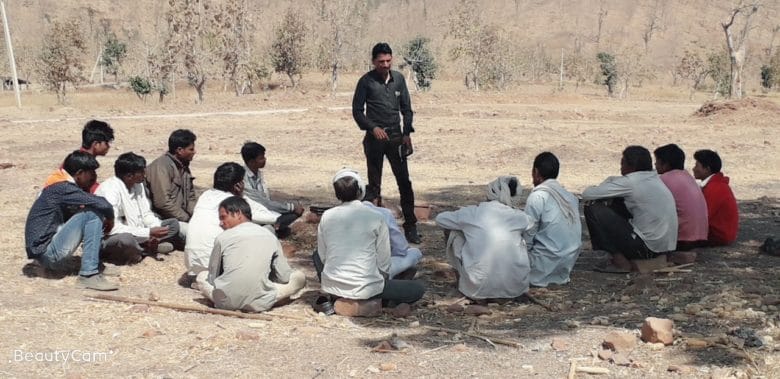“They come every week. They like the Bible stories and seem to understand them, but they are not sharing with their friends. I don’t see much transformation taking place in their lives,” he told me. Sound familiar? Many of us who train or teach others the Word of God long to see greater transformation take place. We want to see our disciples multiply and make more disciples.
Some years ago while reading Steve Smith’s book T4T, I learned about the 3-part meeting. I had also heard about it in a Harvest Multiplication Training (HMT) run by YWAM Frontier Missions leaders.
As I began my first group using this three part system, I understood how powerful this was to bring about transformation. It helped me grow and change as a disciple-maker. I also saw it bringing change for the others in my group as well.
You may be using Discovery Bible Studies, oral culture friendly Bible stories, or something else to train your disciples. Regardless, I strongly urge you to incorporate the three-part system in your disciple-making meetings. This creates a friendly accountability loop that drives change and transformation.
The 3 Part Meeting- What it Is
This concept was first used by Ying Kai, but later put into a chart and words by Steve Smith. I want to be sure to give them credit as this is definitely not original with me! (you can purchase the T4T book here.)
You can use whatever words work well to describe the three parts for you in your context. Smith describes the three parts as:
- Look Back (review)
- Look Up (learn and receive from God)
- Look Ahead (plan and pray)

In using this, I’ve adjusted the sections a bit (from Smith’s description). I am using a hybrid approach that combines elements of both T4T and DBS. I stick to the three parts because of the powerful accountability loop it provides. Let me further describe that further here. The time frames are up to you, but its good to keep them somewhat equal. If you want to have a one-hour meeting, then 20 minutes for each section works well.
Look Back (20 minutes)
In the look back section, we start with Member Care. Instead of jumping straight into your lesson or Bible study, take a few minutes to hear how people in the group are doing. Ask about their families and take any prayer requests. This doesn’t need to be long (5 minutes is enough) but should be sincere.
Then have a brief time of worship. You can sing a few songs or use non-musical worship.
After that you have a time of Friendly Accountability with the group. Ask them about the goals they set in the last meeting. How are they doing at obeying God’s Word from the lesson last week? How did it go when they tried to share their testimony with their auntie? Smith says we should ask about both 1) following and 2) fishing.
Give everyone a chance to answer about both areas. If your group is too big, split into pairs or groups of 3 to do this friendly accountability time.
If you set goals and don’t ask for a report, you are training disciples to be disobedient! You don’t want to do that. So be sure to include this important accountability time as a regular part of your meeting DNA.
The final thing in the first section is Vision Casting. In my experience, this can also be put in the third section. It’s not so important whether you do it in the first or third section of the meeting. What matters is that you do it regularly. Vision casting is a short, simple challenge to reach the unreached in your area. You can use a story, a scripture, picture or a variety of options for the Vision casting part. But be sure to remind them every meeting of the urgency of reaching the lost.
Look Up (20 minutes)
In this section you train them in content from God’s Word. Whether you use a short passage of scripture or a story, keep it brief. The reading of the passage or telling of the story should not be more than 5 minutes long.
After sharing the story or scripture several times, have the trainees/disciples repeat it back to you. This is very important in helping them gain confidence. It also helps you know what they have understood. In the DBS method, this is the “repeat the passage in your own words” part. Be sure that everyone in the group can repeat the passage or story with some level of accuracy before you move on to discuss it. If they make mistakes, gently correct them and ask them to try again until they can each share it well.
Adult learning specialists tell us that taking this step of repeating before interpreting is vital. It helps people to internalize what is being said. If you take time to do this well, you will find you have much deeper and more meaningful discussions about the scripture.
Look Ahead (20 minutes)
Then, you move to discussion and application. I like to use discovery questions I learned from One Story for this, but you can use other questions as well.
These are the questions I normally use:
- What do you like about this story/passage? What don’t you like? (this can include anything they find difficult to understand)
- What do we learn about God?
- What do we learn about people?
- What must we obey?
Other DMM practitioners (using more classic DBS methods) prefer to use these questions:
- What do I discover/learn from this?
- What will I obey?
- Who will I share with? (If you use this question, you are already moving into goal setting).
Find the set of questions that works best for you. But stick to the same questions each time as you train. Variety can hinder multiplication. It needs to become normal and natural to always ask these same things.
During the discussion, make sure each person gets a chance to share. Again, this is why your disciple-making groups should not be too large. If you have a bigger group, split into pairs or threes to answer these questions so each person speaks. As disciples speak out these answers, the Word of God is taking root in their hearts.
Lastly, set specific goals related to following Jesus and fishing for men. You’ve already begun this with the “How will we obey?” question. Solidify it and make clear decisions regarding personal and/or group application of the scripture.
For example, say you study the passage about the Good Samaritan. You might decide as a group to join together to help a needy widow in your community that week. Also be specific about who you will share the gospel or this week’s passage/story with in the coming week. The more specific the goals, the more likely people will do them! And, they know that next week, you will be asking them to report on how that went.
Start with reporting and end with goal setting in each disciple-making meeting. This is what we call the Friendly Accountability Loop. It works! Don’t let time pressure (because you had too long of worship or went into preaching-mode in the lesson time) cause you to skip these things.
Give It a Try!
The three part disciple-making meeting is a proven and effective way to multiply disciples. Remember though, discipleship is more than a meeting! It is life on life, investing in relationships with people. You need to love and walk closely with them if you want to see them develop as the kind of disciples who will make more disciples. The three-part meeting can be a big part of that.
Using it is also very helpful as you transition your DBS or T4T groups into churches (watch for a future blog on how to do that). If DBS and T4T groups are only Bible studies and “real church” is still in a building, you don’t really have a movement. These groups need to become fully functioning “bodies of Christ.” Those kind of groups will reproduce!
Have more questions about this? Do feel free to reach out to me by email, ask it in the comments below or on the DMMs Facebook group.




Comments
Pingback: Projects or People- Where Will You Invest? - Missionary Life
Pingback: 4 Principles of Integral Mission and DMMs
Pingback: Important Questions As You Start the New Year By C. Anderson – ETERNAL IMPACT
Pingback: 5 Primary Struggles in Missionary Teams (and How To Solve Them) - Missionary Life
Pingback: Incredible Multiplication in a Few Short Months as God's Story is Told - YWAM Frontier Missions
Pingback: ¿Puede Dios Usar A Un Hombre Común Y Corriente? - JuCUM Misiones Fronterizas
Very challenging but intentional
Author
What part do you find most challenging?